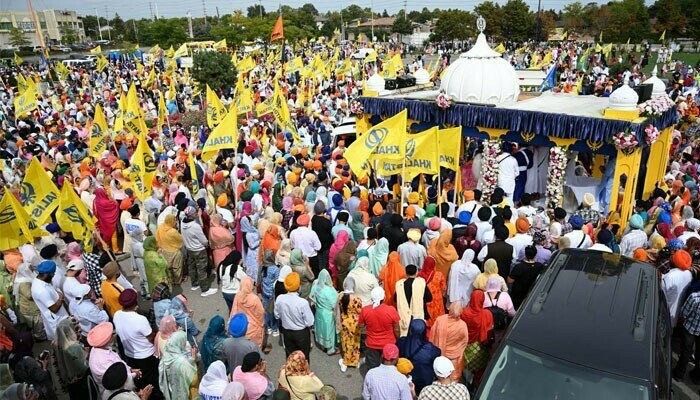DESIBUZZCanada
Events Listings
Dummy Post

International Day Of Yoga To Be Virtually Celebrated Saturday At 4pm

CANCELLED: Coronavirus Fears Kills Surrey’s Vaisakhi Day Parade

ADVERTISE WITH US: DESIBUZZCanada Is The Most Read South Asian Publication Online

SURREY LIBRARIES: Get Technology Help At Surrey Libraries

WALLY OPPAL: Surrey Police Transition Update On Feb. 26

GONE ARE THE DAYS - Feature Documentary Trailer

Technology Help At Surrey Libraries

Birding Walks

Plea Poetry/short Story : Youth Contest

International Folk Dancing Drop-in Sessions
HINDU RASHTRA AND KHALISTAN: Why Is One More Acceptable In India And The Other Is Considered The Wrath
- July 11, 2023
With Rising Outcry For India As a “Hindu Rashtra”, Khalistan Asserts It’s Rally Among Passionate Sikhs In Punjab And Abroad!

EDITOR’S NOTE: The Khalistan Referendum abroad would seem to say that there is a lot of interest in an independent Sikh homeland among Sikhs who were denied their place in history and in India following the partition of India and Pakistan in 1947. In fact, the Indian government is so worried about the Referendum that Sikhs abroad allege that they have hired underworld criminals to murder Khalistan movement leaders like Surrey Guru Nanak Sikh Gurdwara president Hardeep Singh Nijjar, who was gunned down recently in the parking lot of the Gurdwara. There is talk that the Khalistan Referendum represents a real danger that is not seen in Hindu Rashtra among the large majority of Hindus in India because it gives rise to independent movements among other distinct linguistic and cultural states who may also seek to break away from India to independent statehood.
By Promod Puri
Is the Khalistan movement, the demand for separation from India, dead, dormant or alive?
It depends on how one wishes to see or perceive it. For some or many, it does not exist anymore; for others, it is live and viable.
The Khalistan Referendum abroad would seem to say that there is a lot of interest in an independent Sikh homeland among Sikhs who were denied their place in history and in India following the partition of India and Pakistan in 1947.
In fact, the Indian government is so worried about the Referendum that Sikhs abroad allege that they have hired underworld criminals to murder Khalistan movement leaders like Surrey Guru Nanak Sikh Gurdwara president Hardeep Singh Nijjar, who was gunned down recently in the parking lot of the Gurdwara.
There is talk that the Khalistan Referendum represents a real danger that is not seen in Hindu Rashtra among the large majority of Hindus in India because it gives rise to independent movements among other distinct linguistic and cultural states who may also seek to break away from India to independent statehood.
The arrival of Amritpal Singh on Punjab's political stage early this year suggests that it has been dormant but not dead. Though the separatist leader faced dramatic arrest in April and was sent to jail somewhere in Assam, the Khalistan motive among his considerable following stayed behind faded but discernable.
Besides the Khalistan lookout in Punjab, there is another window to view the issue.
The window offers the sight of Khalistan Abroad. The lookout forges an impression that the separatist demand, ferocity and rallying exist firmly in the Sikh communities overseas but not on the Punjab front, where the very mention of Khalistan rolls down the tragic scenes of the '80s.
The expression "Nobody talks about Khalistan in Punjab" sounds true, as the ground realities of day-to-day life in Punjab reveal Khalistan matters not much or insignificant in the state or among the Sikhs in the rest of India, and where people don't want to indulge or hear about it anymore.
Their memories emerge fresh when looking back at the dreadful and catastrophic time Punjab went through.
It was a period of horrific and bloody events in the state; the violence initiated by Sikh extremists, the attack on the Golden Temple by the Indian armed forces, the murder of prime minister Indira Gandhi by her Sikh bodyguards, followed by mayhem and mass killings of innocent Sikhs, looting and terrorism by Hindu mobs with the committed backing of the top leadership of the Congress Party in Delhi and other cities that got inflamed by the anti-Sikh fury.
With that saga, a dark chapter in the history of contemporary India, the separatist movement seems buried or receded to face its demise.

But this has not happened. The Khalistan slogan pops up again and again in India and across the globe, where there is a sizeable Sikh population settled.
The relevancy of the Khalistan topic gets its reception or rejection mainly on what proportion of it exists in Punjab and what proportion animates among the Sikhs abroad.
Even with this, the geographical dissection can't dilute the issue. Nor does the bid for Khalistan deserve the rebuff it often gets from many Indians settled abroad, notably influential and prominent Sikh politicians.
The Khalistan issue gets re-ignited because of the swift toxic, and disturbing changes brought by the ruling Bharatiya Janata Party's decisive agenda to convert India into a Hindu state.
As the nation is undergoing significant transformation in its political and social fundamentals, and even in Hindu percepts because of Hindutva, the Khalistan movement, almost wrapped up in the late '80s, now seems to be unwrapping itself in Punjab, perhaps more overseas.

Despite its sectarian and dogmatic appeal, the justification for Khalistan's separatist goal carries its justification with the rise of violent Hindu fanaticism.
The outcry for Khalistan got rekindled because of the demand of hundreds of Hindu leaders, the so-called gurus and saints, with the support of the Hindu urban middle class, who vehemently clamour to make India a pure "Hindu Rashtra."
The bid for Khliastan and the growing "Hindus only" passion afflict harmful and destructive threats to the nation's integrity and secularity that got challenged only after 76 years when India gained Independence in 1947.
"If the demand for a Hindu India is legitimate, so must be the demand for a Sikh Khalistan."
– writes Ajay Sahani, an analyst, in The Chandigarh Tribune March 6, 2023 edition.
"Crucially, the BJP's broad Hindutva project creates a reflexive justification for Khalistani separatism," he asserts.
In case the brutal scenes of the '70s and '80s of Punjab come back, the role of ultra-fanatic and thuggery gurus and racist leaders of the Hindutva brand of Hinduism offers a major underlining factor.
And this is how a Hindu leader boldly proclaims:
"The progress of the country is possible only with the creation of a Hindu Rashtra; keeping in mind the ancient culture and tradition of this nation, declaring it a Hindu nation is the biggest need today," according to a report filed by Deepak Goswami for The Wire, June 21 edition.
https://thewire.in/politics/madhya-pradesh-in-quest-for-power-is-congress-ready-to-compromise-on-secularism
Here are a few excerpts from the report:
"These (the above) words were spoken not by a leader of the Rashtriya Swayamsevak Sangh (RSS) or a group affiliated with it but by the person who runs the organization that recently merged with the Congress in Madhya Pradesh.
"The organization is Bajrang Sena, and its national president Ranbir Pateria uttered words above." in line with Hindutva nationalism.
"On June 6, many people might have mistaken the Madhya Pradesh Congress Committee (MPCC) office in Bhopal for the BJP. It looked like a Hindutva fortress with saffron flags, loud slogans of 'Jai Shri Ram' and chant of the Hanuman Chalisa.
"Amid such fanfare, the Bajrang Sena rallied towards the Congress office and was welcomed by Kamal Nath, the former chief minister and state Congress president.
"The Congress wants to play the Hindutva card to match the politics of the ruling BJP.
"It appears that the party has abandoned the ideas of secularism or even 'soft Hindutva,' which the Congress was promoting to outwit the BJP's 'hardcore Hindutva.' In its quest for power, the party is eager to embrace the hardline version of Hindutva."
Incidentally, Kamal Nath was the man who led the mob of rioters storming the Gurdwara Rakab Ganj Sahib in Delhi, according to Manoj Mitta and H. S. Phoolka in their book about the riots – When A Tree Shook.
What is noteworthy and disturbing to see here is the political patronage of establishing a Hindu Rashtra extends beyond the range of BJP into the playfield of the Congress Party, the so-called secular and minority-rights champion, under the leadership of Rahul Gandhi, nurturing his beard, like that of prime minister Modi.
So, when the country's two major political forces, the BJP and the Congress, step onto a common platform of establishing a precise Hindu identity for the nation called 'Hindu Rashtra,' where does the future of minorities belong?
The open threats of eliminating Muslims from the "Hindu" soil of India have frightening repercussions among minorities; Sikhs don't feel exception in this ethnic cleansing.
The Khalistan objective gets its rationale here to run parallel to the Hindu Rashtra goal of the BJP and its related political and religious affiliations.
The concern for India's future, its "disintegration," as Obama expressed recently, resides not only in the country but in Canada, the USA, England, Australia and all over among people of Indian origin and others interested in India's affairs.
And it is why Khalistan, as an issue of concern, affirms its case and debate abroad.

Promod Puri is a veteran journalist, writer and author of Hinduism beyond rituals, customs and traditions. Read more of his articles in promodpuri.com and progressivehindudialogue.com)

















